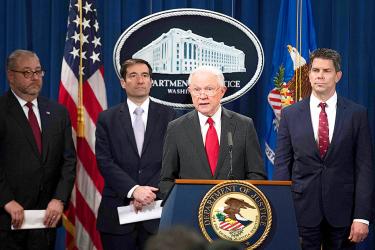China challenged the US yesterday to show evidence to support charges that Beijing backed a scheme by Taiwanese and Chinese companies to steal trade secrets from a US-based semiconductor firm.
US Attorney General Jeff Sessions on Thursday accused the companies of stealing an estimated US$8.75 billion worth of know-how from semiconductor giant Micron Technology Inc.
The US Department of Justice unveiled criminal charges against Chinese state-owned Fujian Jinhua Integrated Circuit Co (晉華集成電路) and Taiwan’s United Microelectronics Corp (UMC, 聯電), along with three UMC officials.
It said they conspired to steal US-based Micron’s advanced designs to turn Fujian Jinhua into a major player in the global computer chip market.
“If the US side is really concerned, they should provide concrete examples that can withstand the test of evidence and facts,” Chinese Ministry of Foreign Affairs spokesman Lu Kang (陸慷) told a regular press briefing.
The charges were the latest in a series of cases targeting what Washington calls an ongoing Beijing program to steal valuable US industrial and commercial secrets to advance the Chinese economy.
“Taken together, these cases and many others like them paint a grim picture of a country bent on stealing its way up the ladder of economic development and doing so at American expense,” Sessions said. “This behavior is illegal. It is wrong. It is a threat to our national security, and it must stop.”
US President Donald Trump has cited China’s alleged theft of US technological know-how among a litany of grievances in his trade spat with the Asian power.
The indictment released in the US district court in San Jose, California, alleges that three former Micron employees in Taiwan — Stephen Chen (陳正坤), He Jianting (何建庭) and Kenny Wang (王永明) — joined UMC in 2015 and 2016 with the express plan of handing over to the company Micron’s design and manufacturing processes for specific DRAM semiconductors.
Those would then be transferred to Fujian Jinhua under a contract set by Chen.
Prior to the alleged plot, neither the Chinese nor the Taiwanese company had any DRAM production capability, US prosecutors said.
Chen was originally a top executive at Micron’s operation in Taiwan. He moved in 2015 to lead UMC, a contract chip manufacturer listed on the New York Stock Exchange, and subsequently became president of Fujian Jinhua.
UMC said that it takes the theft charges leveled against the company seriously and would do everything possible to clear its name.
“For nearly 40 years, UMC has devoted countless energy and resources to the development of integrated circuit-related technology and has won thousands of patents across the world,” the company said, adding that “we will do our utmost to respond to the charges and have hired lawyers to clear our name and defend the interests of our shareholders.”
UMC said that the allegations in the indictment and complaint are “virtually the same as allegations in a civil complaint previously filed by Micron against UMC.”
“UMC regrets that the US Attorney’s Office brought these charges without first notifying UMC and giving it an opportunity to discuss the matter,” the company said.
Micron filed a civil lawsuit against UMC and Fujian Jinhua in December last year at a federal court in California, accusing the companies of intellectual property infringements related to its DRAM chips after prosecutors in Taiwan charged two Micron employees with stealing trade secrets, a Reuters report said.
In January, UMC filed a patent infringement lawsuit against Micron in China and won the lawsuit.
The US Department of Commerce on Monday placed heavy restrictions on Fujian Jinhua’s ability to buy US machinery and materials for its factories that would boost its DRAM production capabilities.
In addition to the criminal charges announced on Thursday, the US Department of Justice filed a civil lawsuit to block imports of any UMC and Fujian Jinhua products using stolen Micron technology.
Source: Taipei Times - 2018/11/03





















